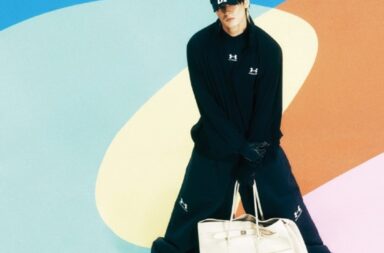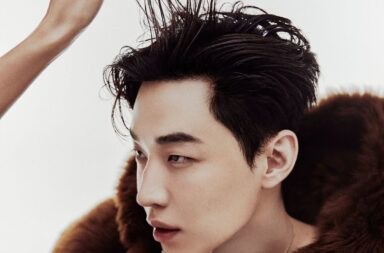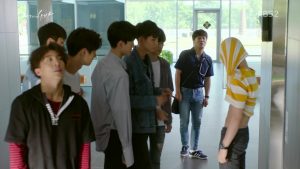 In the first part of this review, I evaluated The Best Hit‘s dissatisfactory time travel plot line. However, at the same time, I conceded that the appeal of the show laid in its phenomenal characters and relationships; introducing the various characters and their lifelike problems. Like I briefly adverted in the first part of this review, this second part will focus on the characters’ development through meeting Hyun-jae, Hyun-jae’s own personal change, and how they further the series’ themes.
In the first part of this review, I evaluated The Best Hit‘s dissatisfactory time travel plot line. However, at the same time, I conceded that the appeal of the show laid in its phenomenal characters and relationships; introducing the various characters and their lifelike problems. Like I briefly adverted in the first part of this review, this second part will focus on the characters’ development through meeting Hyun-jae, Hyun-jae’s own personal change, and how they further the series’ themes.
Starting off with Ji-hoon’s character arc, it was by coincidence that Gwang-jae found Ji-hoon’s Star Punch Entertainment ID, leading Ji-hoon to re-think his priorities and setting them straight; his own resolve and Woo-seung’s encouragement guiding him to become an idol again after he briefly quits Star Punch Entertainment. Nonetheless, Hyun-jae was the person who criticized his way of living at the start and planted the idea in his head to become an idol with a more independent image, which arguably led him openly revealing his idol aspirations to his adoptive dad, and sign with Gwang-jae’s company rather than a large commercial label. Through taking these actions, Ji-hoon develops confidence in himself and gathers more certainty about his life.
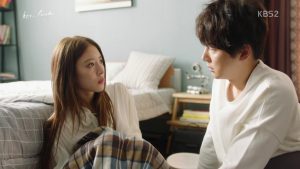
Another person whom Hyun-jae changes for the better is Woo-seung. Like how he questions Ji-hoon’s dishonesty toward his dad, he inquires Woo-seung as to why she is so desperate to become a civil servant. As briefly mentioned earlier, her passion for music was always present, albeit muted by her desire for stability. Ji-hoon notes that she used to be a good piano player, but stopped a long while ago. Having Hyun-jae so intimately positioned into her life seemed to re-ignite her passion for music — shown near the end of the series as she begins dabbling in songwriting.
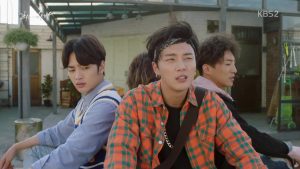
Despite the fact that Woo-seung and MC Drill are only connected to each other through their mutual friend Ji-hoon, with Hyun-jae initially being a complete stranger to all of them, the group of four bond over nights of shared drinks, food, laughter, and cohabitation. It was extremely heartening to watch them gradually grow closer, yet each develop distinctive relationships amongst one another.
For example, the romance between Hyun-jae and Woo-seung progresses predictably, but compellingly. In one episode, Ji-hoon asks Woo-seung a rhetorical question:
What if I hadn’t been your friend from the start? If the two of us hadn’t met in a normal way, but had met like you and Thumbs Up did — with strange coincidences happening again and again, and coming together through extraordinary situations, like in a movie — if we met like that, could things have been different between us, too?
He sums up why it is obvious from the beginning that Woo-seung and Hyun-jae were fated to be together in the universe of The Best Hit; why the audience knew intuitively that Woo-seung was going to reject Ji-hoon the moment he confessed to her — that he never stood a chance as a romantic rival against his biological father. Notwithstanding, to say that Ji-hoon’s perspective is an entirely accurate summation of Hyun-jae and Woo-seung’s relationship is to unfairly simplify it. After all, he wasn’t privy to all the different private moments of their relationship like the audience was.
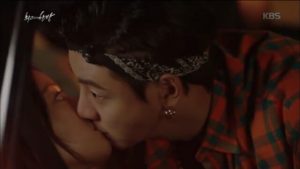
Sure, without a doubt, there were moments foreshadowing their romance in the first few episodes — like the hilariously meta spinning car scene parodying the wide-eyed kisses of yesteryears’ K-dramas with the intro sax riff of “Careless Whisper” playing in the back. But while these moments play a crucial part in bringing out Hyun-jae and Woo-seung’s relationship chemistry, they aren’t the sole reason why Woo-seung falls for Hyun-jae.
Although she never says so explicitly, Woo-seung likes Hyun-jae because he gives her that affirmation that she was unconsciously looking for — the notion that unpredictability isn’t such a bad thing. He drags her out of her comfort zone constantly: questioning her way of living, dragging her out on a makeover shopping trip, coercing her to sing a song inside a recording studio, and throwing a temper tantrum so that they can both take pictures inside a mall booth intended for little kids.
Not only do these moments like these bring Woo-seung some good memories to look back on, they show Hyun-jae’s consideration toward her emotional well-being. Unlike her mom, who did everything she did out of her own benefit, Hyun-jae has Woo-seung’s best interests in mind.
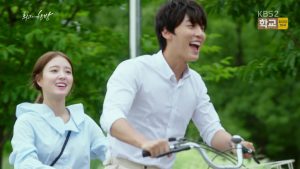
The shopping trip gives her a much-needed break from her intern work, and the singing inches her toward her passion for music. But, at the same time, when Woo-seung needs comfort, Hyun-jae never pauses to provide it; rushing to escort her home after she injures her legs in the mountains, placing a costumed bear head over her eyes when she cries in public, and bringing her to eat the jajangmyeon that she last ate with her father in one particular moment of brazen spontaneity.
Another one of Hyun-jae’s important relationships — the tentative biological father/son bond he has with Ji-hoon — is also developed nicely. Initially, Ji-hoon is wary of Hyun-jae, and with good reason. Hyun-jae is a nuisance to his housemates: bumming around all day, taking up space in Ji-hoon’s house, and leeching off of their resources. When Ji-hoon learns about Hyun-jae’s true identity, his dislike for him is only intensified — clearly demonstrating his animosity by proclaiming that Gwang-jae is his one and only true father.
And this makes sense, considering the history that Hyun-jae has with Gwang-jae and Bo-hee — abandoning a pregnant Bo-hee and crippling World Entertainment by running away with all of J2’s profit. Coupled with the confusion of having to compete with his same-aged dad for the heart of his dream girl, Ji-hoon’s antagonism toward Hyun-jae is completely fathomable.
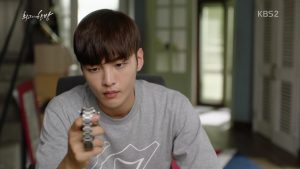
However, when Hyun-jae tweaks Ji-hoon’s slightly flawed song composition into an original pop banger and unquestioningly devotes time to create choreography for Ji-hoon and MC Drill’s debut as the duo JB, Ji-hoon catches a glimpse of his unrivaled musical talent and newly developed compassion. From there on, he gains a grudging respect for him. But there is a certain distance between them present during their interactions — shown in the scene in the last episode where Hyun-jae comes to see Ji-hoon after returning from 1994. It is clear that they will never be on the level of closeness that Ji-hoon shares with MC Drill, Woo-seung, or Gwang-jae because of the complicated history between them.
Hyun-jae himself is also changed through all his time travel experience and consequent encounters with the different characters mentioned. The first obvious change is his appearance. Hailing from the era of Seo Taiji and Boys, he is initially a fish out of water in 2017 with his outdated slang and fashion. Although he continues using his antiquated “Thumbs Up” catch-phrase, Hyun-jae starts sporting a new haircut and swaps his baggy clothes for a preppy modern business-casual look mid-series.
But beyond that, there is a delicate and inexplicable transformation about him. Bo-hee summarizes it best when she states that there are little mannerisms that distinguish the present-day Hyun-jae — “Kim Da-bong” — from the 1994 Hyun-jae. Perhaps this has something to do with Hyun-jae’s character development as he comes to the present. At first, he acts with self-conceit: being primarily concerned with getting a cellphone and finding the money he lost, showing blatant disregard for the others in the rooftop house, and placing himself and his needs as a number one priority.
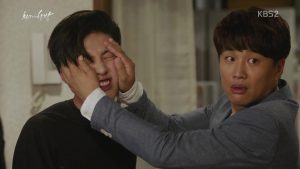
Later, as Hyun-jae casually reveals to Woo-seung that he was a friendless kid growing up without parents and relying on only music for solace, the reasons for his initial behavior becomes clear: from a young age until his early adulthood, he has built a wall around himself to help endure the loneliness he felt.
Nonetheless, as he grows closer to Gwang-jae and Woo-seung, and finds out that Ji-hoon is his son, he becomes much more invested in their affairs. Before he knows it, he learns to really care about them. After moments of self-conflict, he begins doing small acts of kindness like hiding Ji-hoon’s Star Punch ID from Gwang-jae and helping Woo-seung at her part-time jobs.
But later, he goes out of his way to fully dedicate himself to helping all of them: blackmailing Park Young-jae (his former J2 group mate, played by Hong Kyung-min) to pay off Gwang-jae’s debt and instate him as a general producer so that he can help out Gwang-jae and Ji-hoon, standing up for Woo-seung at work, and tricking Young-jae into letting his superstar talent MJ (Cha Eun-woo) join World Entertainment for Gwang-jae’s benefit.
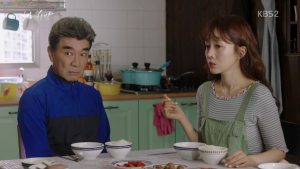
Meanwhile, Hyun-jae’s presence in his life grants Gwang-jae some closure over his 1994 disappearance, allowing him to step out of Hyun-jae’s shadow and live for himself — made apparent through officially restarting World Entertainment and his comically botched proposal to Bo-hee.
Bo-hee herself undergoes a development. By gradually letting Hyun-jae go, she is eventually able to accept Gwang-jae’s proposal with open arms. In the end, she decides to put her career on the back burner and focus on her role as a mother and a wife, regaining her sense of purpose and certainty.
Soon-tae is the final character to be granted a conclusion. His Alzheimers’ story is perforated with comedy and tragedy. When he first finds out that he has the disease, he purchases a book guide on how to battle Alzheimers, and misplaces it, only to find out that Mal-sook took it to her school for silent reading. Later, he wanders the street in a dementia-filled daze, scaring middle-aged ladies in a tragicomical sequence. In a particularly moving scene near the end that beautifully concludes his arc, Soon-tae confronts a phantasm of his daughter; a subliminal attempt by his own mind to absolve him of the guilt and regret he feels over her death.
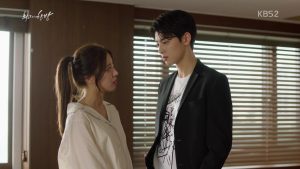 Nevertheless, as good as the character development may be, there are a few notable blemishes. For instance, MC Drill’s character starts off with moderate screen time, but is barely present near the end of the series. Beyond his stage fright, hidden old age, and how he was fired from the debut team, he isn’t given much development either. Which is too bad, because his stage fright could have lended itself to an interesting arc.
Nevertheless, as good as the character development may be, there are a few notable blemishes. For instance, MC Drill’s character starts off with moderate screen time, but is barely present near the end of the series. Beyond his stage fright, hidden old age, and how he was fired from the debut team, he isn’t given much development either. Which is too bad, because his stage fright could have lended itself to an interesting arc.
It would have been interesting to flesh out Do Hye-ri as a character as well. She had the potential to become one of the most well-developed characters in the series; there is so much to parse in regards to her character, like her eating disorder and her mysterious infatuation with Ji-hoon. But, unfortunately, her eating disorder is only lightly touched upon, and the show doesn’t go into much detail about her crush on Ji-hoon.
Finally, in the start of the series, Woo-seung’s tear duct issue is utilized constantly for comedic effect. However, it is completely dropped as the series went on. Personally, I didn’t find this to be too big an issue, but I thought it would have made an amusing running gag if they continued with it.
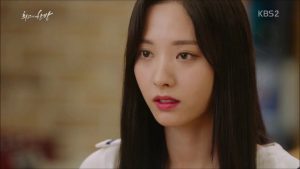
Underneath the comedy bits, lovable characters, and sweet relationships, there is one last small but key ingredient that contributes to The Best Hit’s delectable feel-good flavor: the themes. There is a certain beauty about how honeyed, yet grounded in realism they are. By the end of the series, several notable themes should be obvious: the importance of relationships, how experiences vastly shape individuality, and that life’s unpredictability is its godsend to mankind.
Not much explaining is needed for the first and last theme listed. By perusing through the explanations of the various characters’ development listed earlier in this review, they should become apparent. Although these themes aren’t particularly groundbreaking, there exists an evocative charm in how delicately they are woven into the characters’ plot threads.
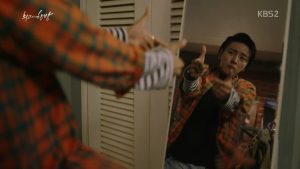
Meanwhile, the individuality theme is cleverly explored through the time travel plot. As the two Hyun-jaes meet in 1994, they are different people in both a literal and figurative sense. This isn’t to say that they don’t share any similarities. They both start off as big-headed, selfish, and drunk on their success in 1993, but are humbled down by their respective experiences; the 1994 Hyun-jae coming to terms with his mortality by facing an incurable disease and the one that traveled to 2017 learns to show consideration toward others.
However, their eminent differences lie in how they choose to handle the events — the 1994 Hyun-jae becomes jaded by his disease and chooses to commit the ultimate act of noble idiocy by running away from World Entertainment and Bo-hee while the 2017 Hyun-jae remains optimistic and jocular, being unafraid to rely on others by sharing his feelings and experiences with them. Although I wouldn’t exactly say that the addition of this addition to the time travel plot entirely made up for its shortcomings, the way the series cannily entwines the plot thread and the theme together was definitely a pleasant surprise.
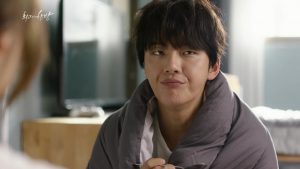
Most of the actors did a great job, but I’ll warrant a brief mention for Yoon Shi-yoon. His goofy facial expressions brought the playful quirks of Hyun-jae to life, and his character’s moments of introspection are played skillfully with a subtle nuance. This is especially apparent in the scene I mentioned just earlier, where the two Hyun-jaes meet in 1994 — when Yoon Shi-yoon adroitly portrays the different impressions that the two Hyun-jaes evoke.
To nip this review in the bud, the ending was a perfect way to to top off the series. There are no grand epilogues of Soon-tae winning the battle against his Alzheimers, Bo-hee and Gwang-jae having a wedding ceremony, or Ji-hoon and MC Drill becoming superstars.
This furthers one of the previously mentioned underlying themes: we don’t know for sure what will become of our characters, but that’s the allure of it — letting their ending be a mystery like how our own endings are a mystery; placing faith in the fact that the characters’ and our own “best hits” have yet to come; accepting the future’s capriciousness while savoring life’s unpredictability as its delicious natural zest.
Perhaps my own future will consist of re-watching the show to relive the characters’ stories and re-experience the feel-goodness of the themes and humor. Who knows? Maybe yours will too, if you are able to look past the small imperfections and sub-par time travel plot.
(Images via KBS)
